![]()
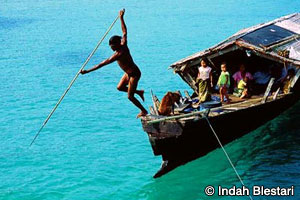 In our ever changing world, there are still tribes who live with distinct lifestyles, people who know neither crisis nor growth.
In our ever changing world, there are still tribes who live with distinct lifestyles, people who know neither crisis nor growth.
The Moken, known as Sea Gypsies, have migrated from southern China to Malaysia, Thailand and Burma some 4,000 years ago. In line with the Orang Laut, the Urak Lawoi or the Moklende, with which it shares cultural practices, this ethnic group is originally Austronesian (language family used from Madagascar to Easter Island and from Taiwan to new Zealand – a language formerly known as Malayo - Polynesian).
Before migrating, the Moken originally lived in fixed-settlements yet were incredibly fast to adapt to their new environment. Following winds and currents, Sea Gypsies cruise around the eight hundred islands that form Mergui archipelago on traditional wooden boats named kabang. Kabang are houseboats used for sailing from island to island in search of sustenance, or for the sake of preserving their health and safety. During monsoon season (from May to November), Sea Gypsies settle for a few months in makeshift houses built on stilts, often located on the east coast of an island, sheltered from the strong and dangerous southwest wind typical to this season.
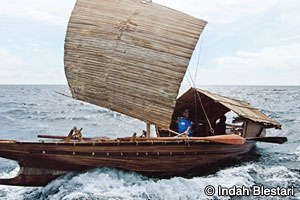 Shamanistic and animistic, the Moken have a very special relationship with the sea and nature. Their survival fully depends on the sea; by fishing and picking up shells on the seabed, they even have developed a unique underwater vision (their underwater vision – without goggles - is twice as sharp as us). This profound relationship with nature has even allowed some tribes to escape the devastating waves of the tsunami on December 26, 2004.
Shamanistic and animistic, the Moken have a very special relationship with the sea and nature. Their survival fully depends on the sea; by fishing and picking up shells on the seabed, they even have developed a unique underwater vision (their underwater vision – without goggles - is twice as sharp as us). This profound relationship with nature has even allowed some tribes to escape the devastating waves of the tsunami on December 26, 2004.
Unfortunately the number of nomad Moken has fallen sharply in recent years. They were ten thousands at the beginning of the century; they now are only a few hundred – most of them in Myanmar (Burma) still living according to the Moken tradition. Under pressure from Thai and Burmese governments which are suspicious of their independent lifestyle, under political control post tsunami, tourism development and industrial fishing, a majority of Moken - considered as citizens without borders - were forced to settle in national parks where it is impossible for them to practice their traditional rituals.
Fortunately, a few diehards’ families still resist globalization and continue to practice their traditions; cruising the clear waters of the Mergui Archipelago on their kabangs. The ocean is their world, the boat their home and the sea their country... but for how long?
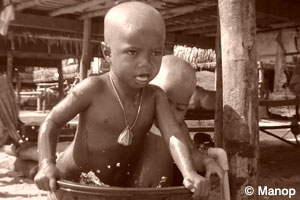 |
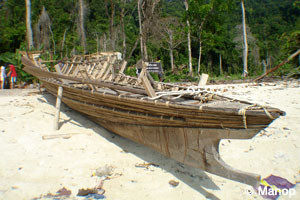 |
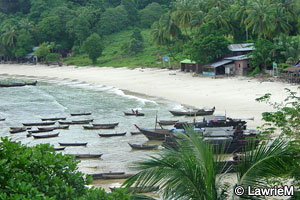 |
![]()
![]()
| Tweet | S/Y Aventure |  |
 |
![]()


